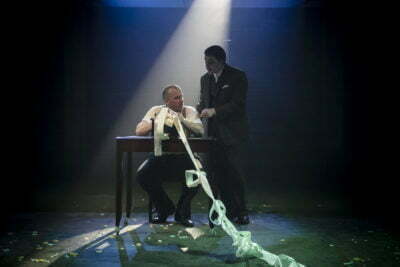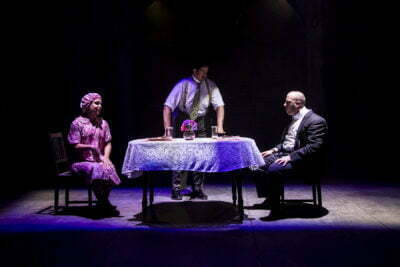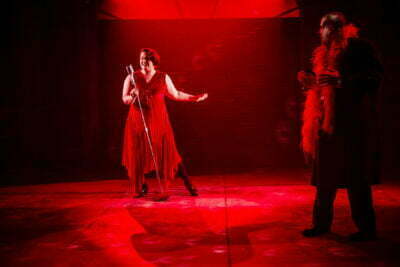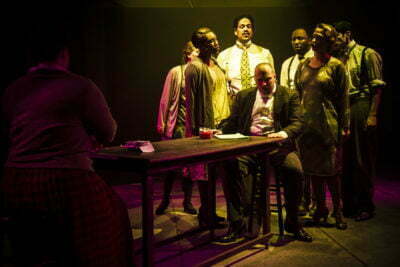Adding Machine: A Musical
Music by Joshua Schmidt
Book and Lyrics by Jason Loewith and Joshua Schmidt
Directed by Geoff Button
Musical Direction by Matt Deitchman
Choreography by Katie Spelman
Produced by The Hypocrites, Chicago
Evocative Music Modernizes a Classic
Elmer Rice’s 1923 expressionistic drama The Adding Machine was one of the landmark moments in the development of a new American theatre that had to differentiate itself from cinema. In terms of plot, the play bore some resemblance to Henrik Ibsen’s pre-naturalistic poetic romance Peer Gynt. But while Ibsen’s protagonist was a fairy-tale character and borderline supervillain who is nearly condemned to endless reincarnation because of his failure to develop a consistent identity, Mr. Zero, Elmer Rice’s protagonist, is a servile wretch and the world’s chew-toy. In 2007, Evanston’s now-defunct Next Theatre adapted Adding Machine to music with a score, by Joshua Schmidt, that would be more accurately described as a modern opera. In a new production by The Hypocrites under the direction of Geoff Button, Adding Machine: A Musical still presents a nightmarish, lonely world, but it has also been stripped down to the minimum necessary staging, design, and music. The result brings Mr. Zero’s emotional tumult to the forefront in a fittingly understated manner.

Patrick Du Laney, who is making his Chicago debut as Mr. Zero, is slumped over a table and facing away from us as we enter the theatre. There is a periodic pinging noise which, while not unpleasant in itself, becomes monotonous, until it speeds up as the play is about to begin, thrusting Mr. Zero into yet another grueling day. It goes the same way as every other for the past twenty-five years: he wakes up to the mindless babbling of the shrewish Mrs. Zero (Kelli Harrington), goes to work adding numbers for a corporation he doesn’t care about and which doesn’t care about him, and comes home to get nagged at some more. As their twenty-fifth anniversary approaches, Mrs. Zero is getting worse than usual, declaring that she wishes she’d never married him and deliberately making every minute at home horrible. Mr. Zero would much rather be with Daisy (Neala Barron), the woman he works with, but he’s rude to her, too, and she has her own arias in which she wishes he was nicer to her.

The only bit of hope in Mr. Zero’s life is that he expects to be promoted upon having also completed twenty-five years with the company. Instead, he gets fired and replaced with an adding machine. Driven into a rage, he kills the boss, and then goes home to an insipid party, where Mrs. Zero degrades him in front of the guests until the cops show up to arrest him. While he’s in prison, the show starts getting weirder, and when he arrives in the afterlife, Mr. Zero is confronted with existential questions that are beyond his capacity to understand.

Du Laney walks a careful line, maintaining our capacity to pity Mr. Zero, while always keeping him a loser. His confession at the police station is his one opportunity in life to make himself heard, and yet, he finds ways of making legitimate grievances sound petulant. Button’s direction, and the script, which Schmidt collaborated on with Next’s artistic director Jason Loewth, suffuse the play with absurd humor. Mr. Zero is put on suicide watch prior to his execution, and the prison staff ridicule his uninspired choice of a last meal. But Mr. Zero is hardly alone in the smallness of his dreams. This is a world of people who were promised very little in life, and find they can’t even achieve that much.

Matt Deitchman’s musical direction is what makes this production so effective and distinctive. The orchestra consists only of two keyboards and percussion, which are scattered throughout the edges of the playing space. The singers, who are often in their head-voices, are deliberately distorted through the microphone echo. While this sacrifices some of the lyrics, it greatly enhances the show’s unsettling, otherworldly atmosphere. Just nine actors in all create several haunting stage pictures, and scenic designer Lauren Nigri’s minimal set helps to keep the show fluid, while commenting on the lack of substance in the world it depicts (one of the few props is a plastic flamingo used to represent a disappointing afterlife). Mike Durst’s dark, dramatic lighting designs do the heavy duty of supporting the actors in creating the look of the show. After about an hour’s worth of satisfyingly black comedy and somewhat dated, although still valid, social commentary, the story’s tension slackened due to a lessened sense of danger. For that reason, Adding Machine: a Musical is not for everyone (not that it ever pretended it was), but it is a remarkable piece of staging, acting, and music.
Recommended
Jacob Davis
3jacob.davis@gmail.com
Reviewed April 1, 2016
This show has been Jeff recommended.
For more information, see Adding Machine: A Musical’s page on Theatre in Chicago.
Playing at The Den Theatre’s Heath Main Stage, 1329 N Milwaukee Ave, Chicago. Tickets are $36 with discounts for students and groups. Performances are Fridays at 8:00 pm, Saturdays at 3:00 and 8:00 pm, and Sundays at 3:00 pm through May 15 (on which the performance is at 7:00 pm). Running time is ninety minutes with no intermission.

